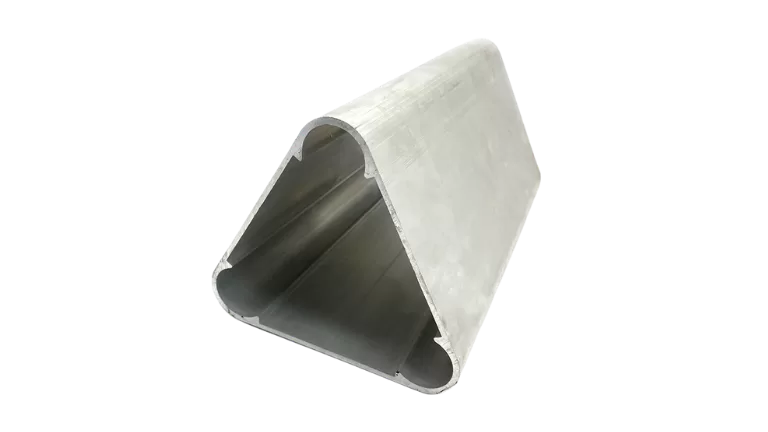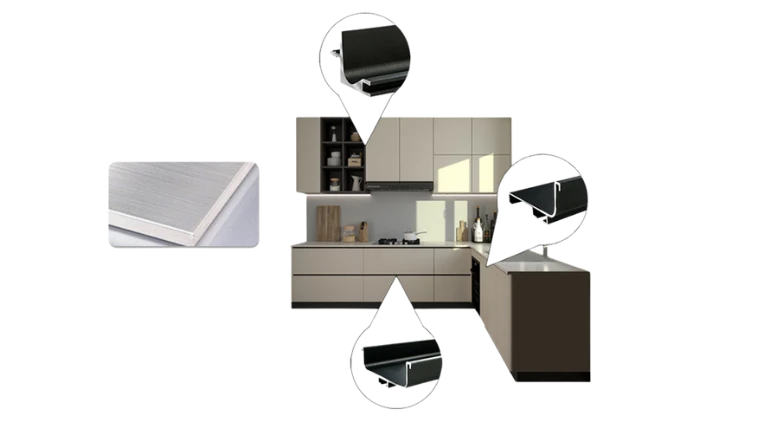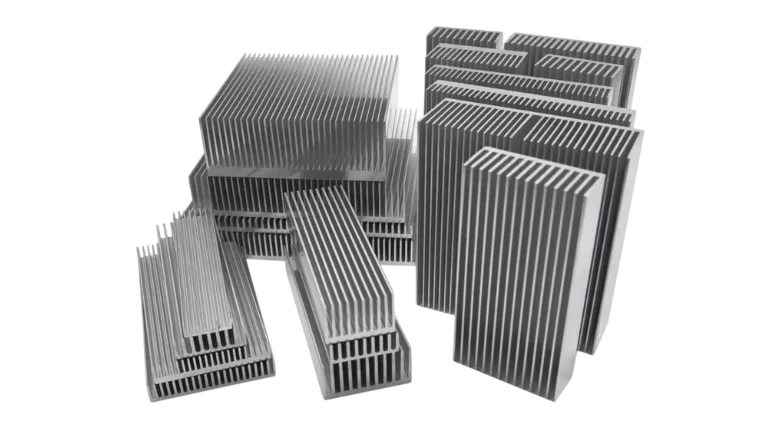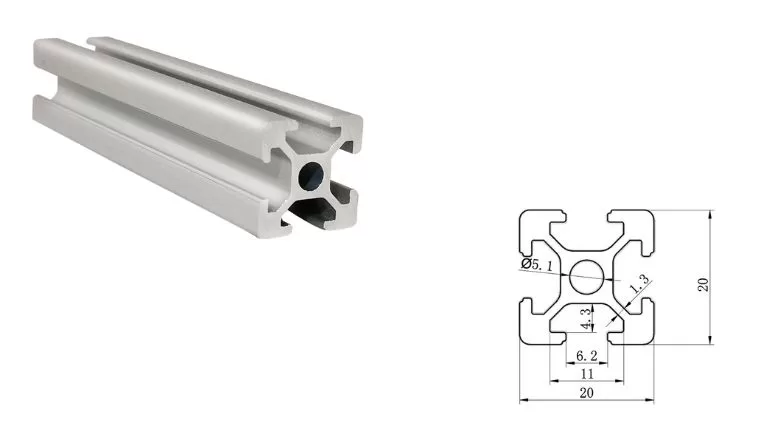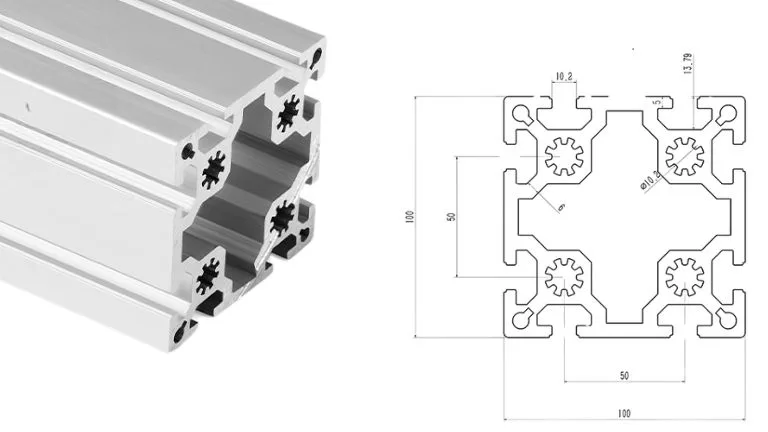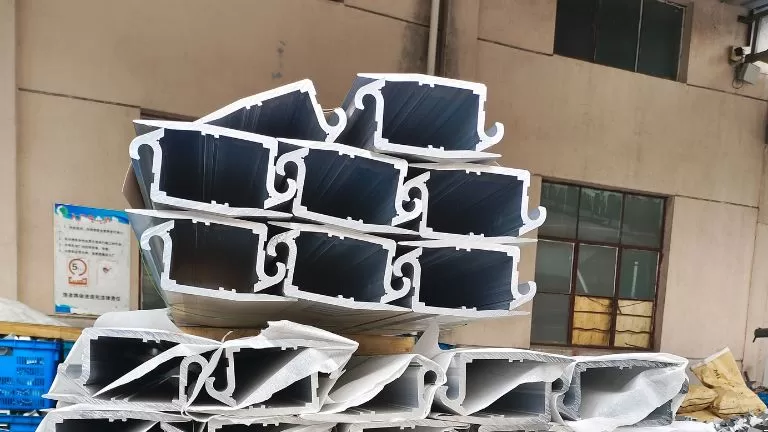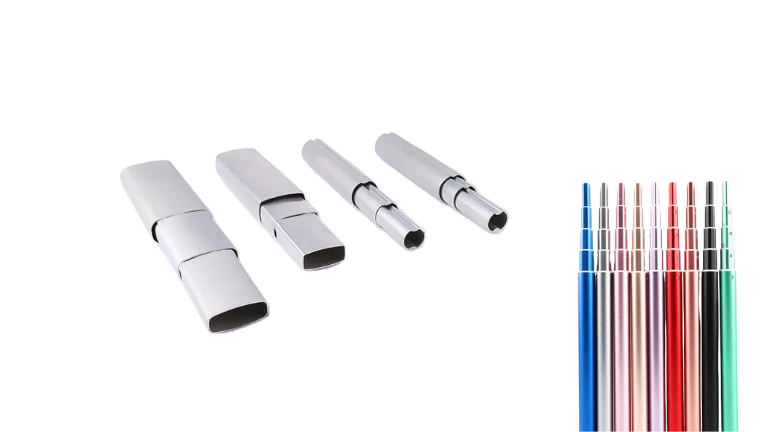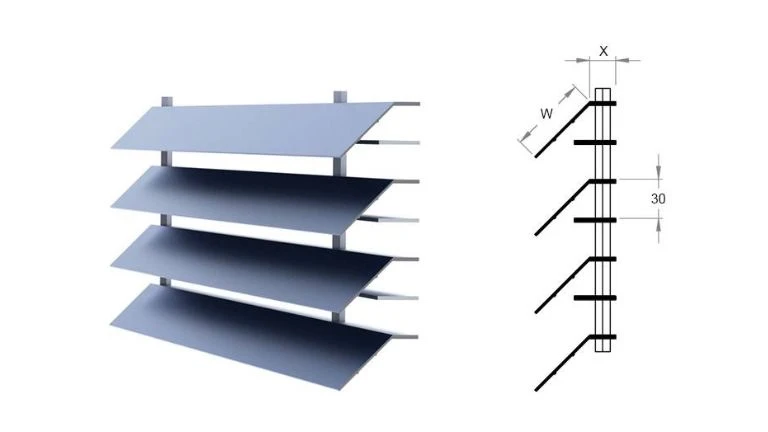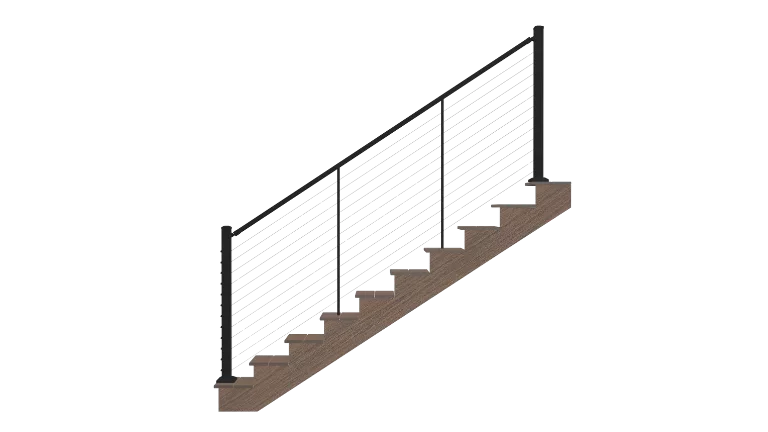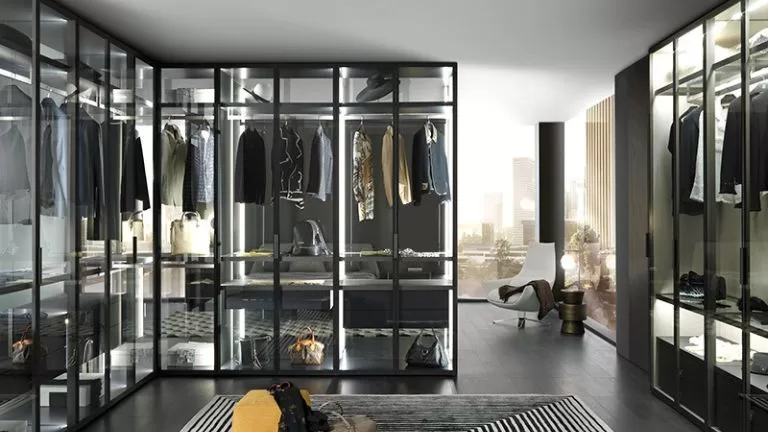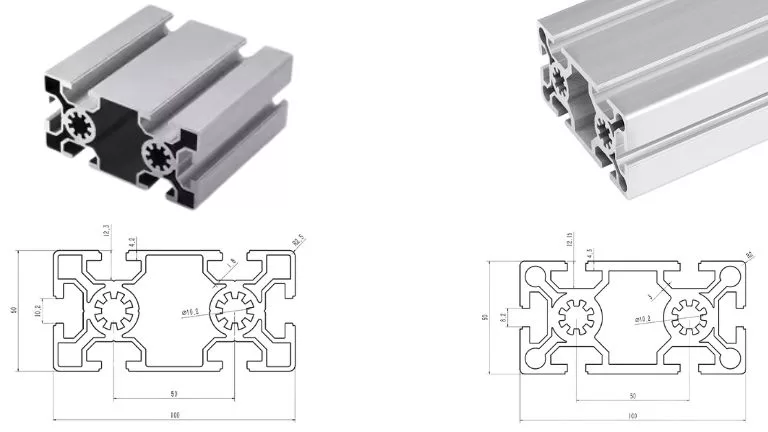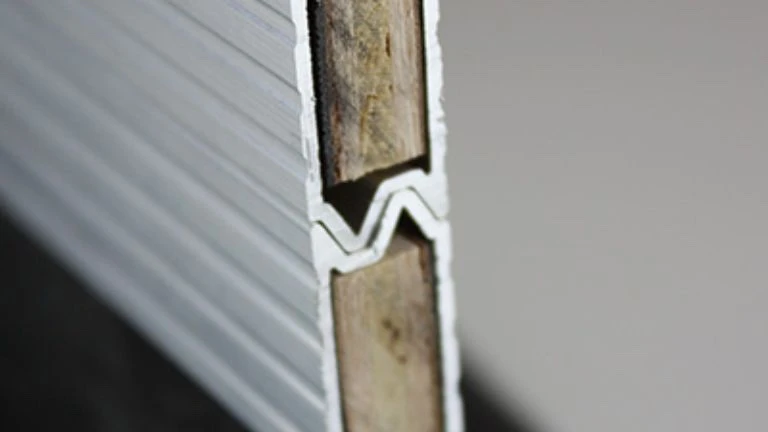Extruded Aluminum Cylinder Tube Solution
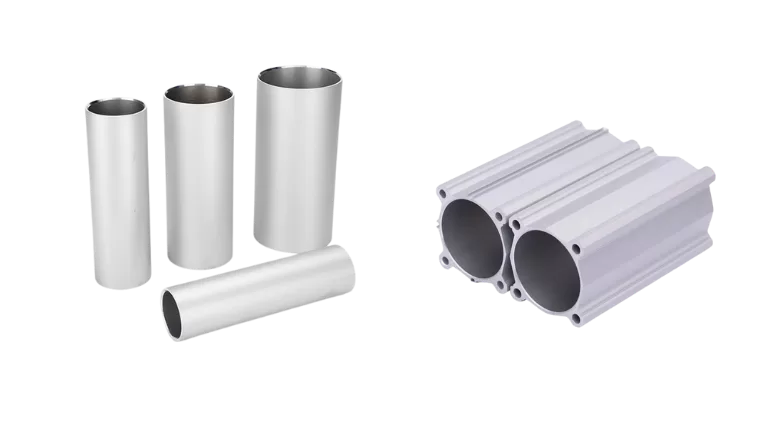
Aluminum cylinder tubes are widely used metal pipes typically made from aluminum alloy materials, favored for their lightweight properties, high strength, and corrosion resistance.
The manufacturing process of aluminum cylinder tubes usually involves extrusion molding and precision machining, ensuring uniform wall thickness and superior surface finish. To meet diverse application requirements, these tubes are available in multiple diameters and thickness options, allowing for customization. Additionally, surface treatments such as anodizing and electrophoretic coating can be applied to further enhance corrosion resistance and aesthetics.
Thanks to their excellent thermal conductivity and malleability, aluminum cylinder tubes play a vital role in heat exchangers, gas and liquid delivery systems, and other critical applications.
Aluminum Cylinder Tubing Manufacturer
As a specialized manufacturer of aluminum cylinder tubing, we offer end-to-end production solutions tailored for precision applications. Our process begins with custom mold design and extrusion to create high-strength tubing with tight tolerances. We provide comprehensive finishing options, including anodizing, powder coating, and precision machining, ensuring each tube meets rigorous performance and durability standards. With advanced quality control and flexible customization, we deliver reliable aluminum cylinder tubing for hydraulic, pneumatic, and industrial applications worldwide.
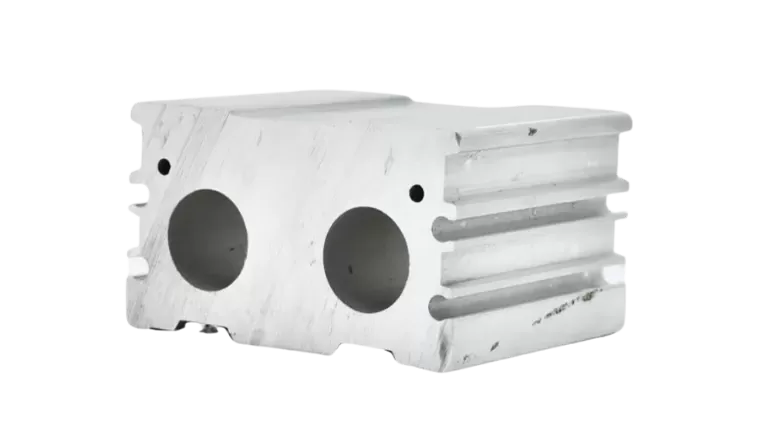
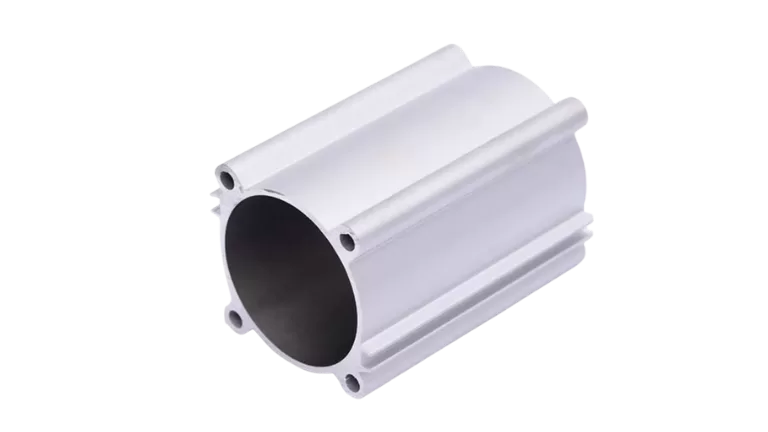
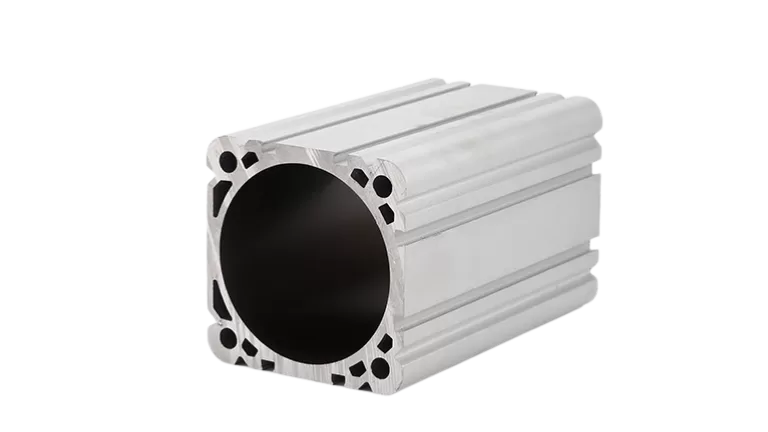
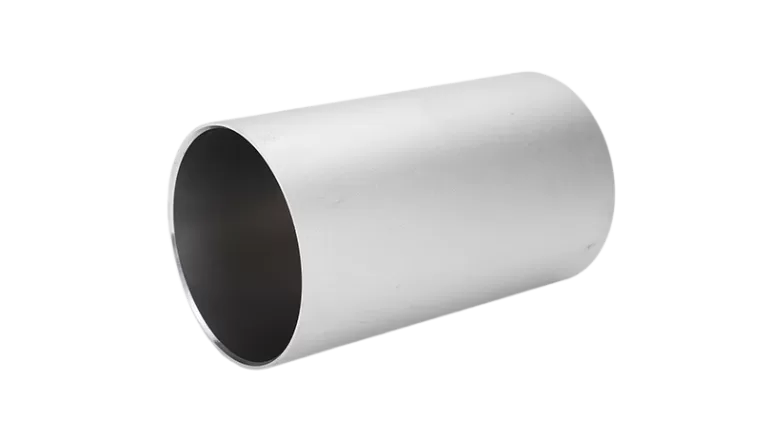
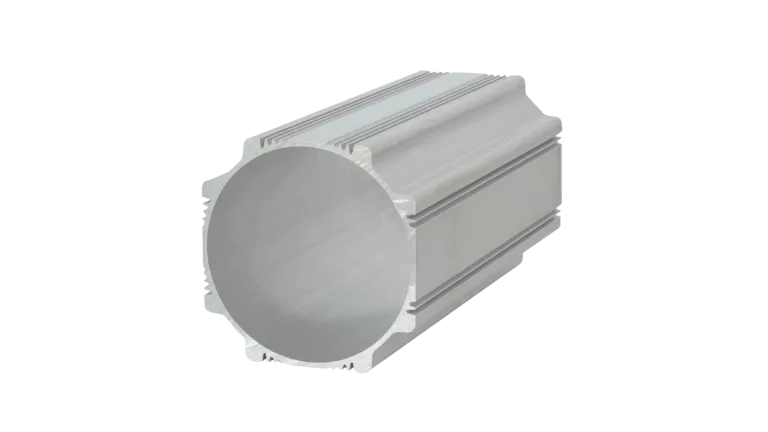
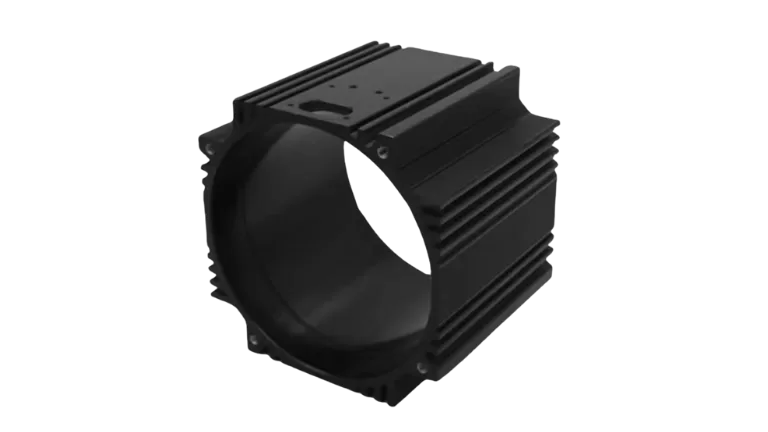
Aluminum Cylinder Processing Capabilities
As a leading aluminum extrusion manufacturer based in China, we are committed to providing high-quality aluminum profiles for a wide range of industries. Our capabilities start with custom mold design and manufacturing, ensuring precise extrusion shapes that meet the specific needs of our clients. From raw extrusion to surface finishing and advanced machining, our fully integrated manufacturing processes enable us to deliver aluminum profiles that meet exacting standards and cater to the unique requirements of each project.
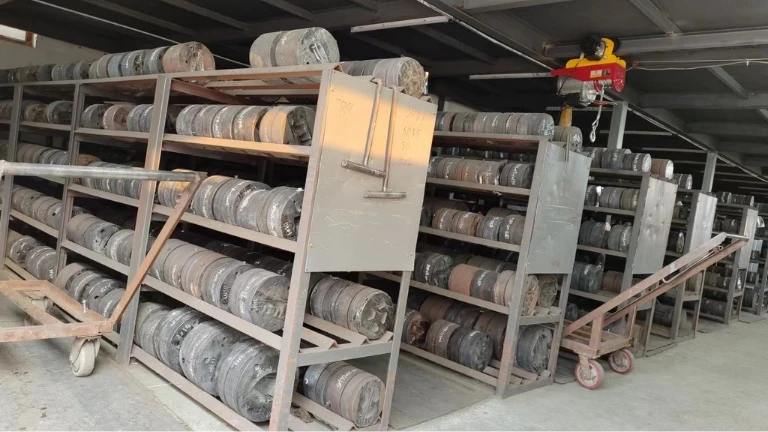
Mold Design and Development
We possess the expertise to design and produce extrusion molds in-house, ensuring precision and efficiency in aluminum profile manufacturing. Our experienced team works closely with clients to develop custom molds based on drawings or samples, ensuring optimal performance for their specific requirements. Typically, the mold production process takes about 7 days, after which we provide samples for client confirmation before beginning full-scale production.
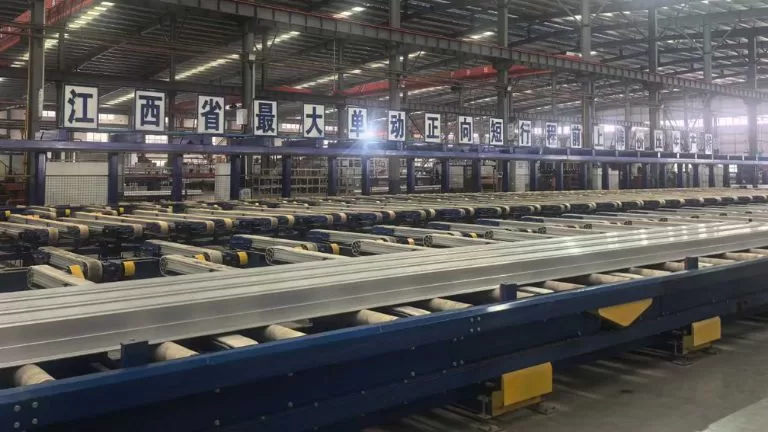
Aluminum Profile Extrusion
Our production facility houses over 40 advanced extrusion lines, featuring cutting-edge equipment such as a powerful 6000-ton extrusion press. This enables the creation of aluminum profiles in various sizes and forms, ranging from standard industrial applications to specialized products like thermal break profiles for high-end doors and windows. The flexibility of our extrusion capability ensures we can cater to a broad spectrum of industries, including construction and precision engineering.
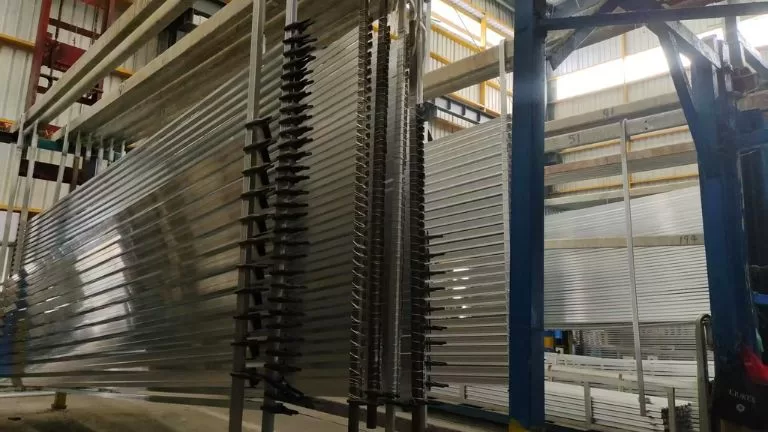
Surface Treatment
With advanced surface treatment capabilities, our facility features 1 anodizing and electrophoretic coating line for enhanced corrosion resistance, 4 powder coating stations (including 2 horizontal and 2 vertical units) for durable finishes, 1 PVDF fluorocarbon spray line for superior weather resistance, 6 wood grain transfer lines for elegant decorative effects, and 2 sandblasting units for optimal surface preparation.
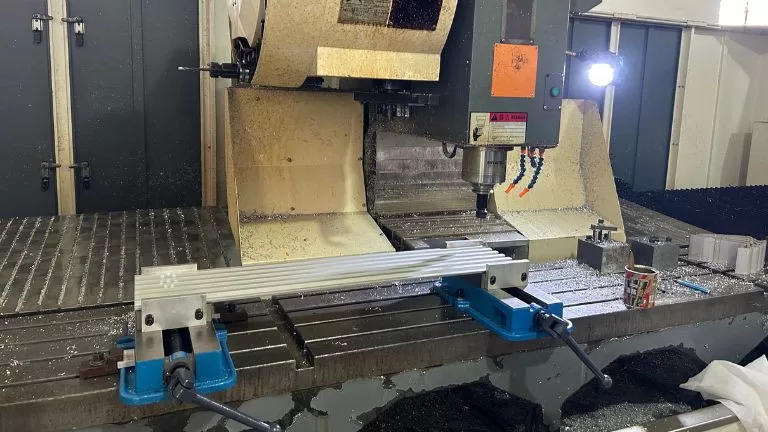
Machining and Fabrication
To provide complete aluminum profile solutions, we offer extensive further processing capabilities. Our services include CNC machining, milling, threading, drilling, precision cutting, punching, welding, assembly, as well as surface marking options such as silk-screen printing and laser engraving for logos or identification. This comprehensive range of fabrication options allows us to deliver ready-to-use profiles tailored to exact project specifications, offering unmatched flexibility, traceability and reliability to our customers.
Common Aluminum Cylinder Tubes
Aluminum cylinder tubes can be categorized into various types based on structure and functionality. These include standard round tubes and profiled tubes, surface treatment types such as anodized, hardcoat anodized, and powder-coated variants, as well as precision grades like standard tolerance and precision-ground tubes. Functional classifications cover lightweight thin-wall tubes, high-pressure-resistant models, and self-lubricating designs. Custom options like grooved tubes and composite multilayered tubes are also available to meet specialized industrial requirements.
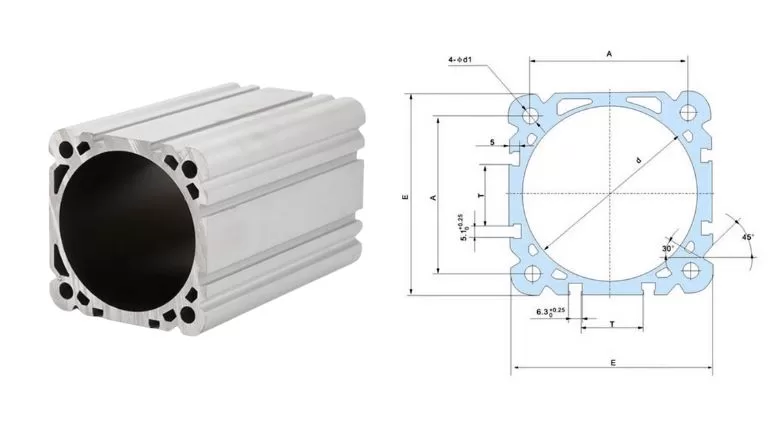
| NO. | d | E | A | T | 4-Φd1 |
|---|---|---|---|---|---|
| 1 | Φ32 | 44×44 | 32.5×32.5 | 8.2 | M6 Φ5.1 |
| 2 | Φ40 | 51×51 | 38×38 | 11 | M6 Φ5.1 |
| 3 | Φ50 | 64×64 | 46.5×46.5 | 17 | M8 Φ6.7 |
| 4 | Φ63 | 75×75 | 56.5×56.5 | 26 | M8 Φ6.7 |
| 5 | Φ80 | 93×93 | 72×72 | 28 | M10 Φ8.7 |
| 6 | Φ100 | 111×111 | 89×89 | 35 | M10 Φ8.7 |
| 7 | Φ125 | 134×134 | 110×110 | 55 | M12 Φ10.3 |
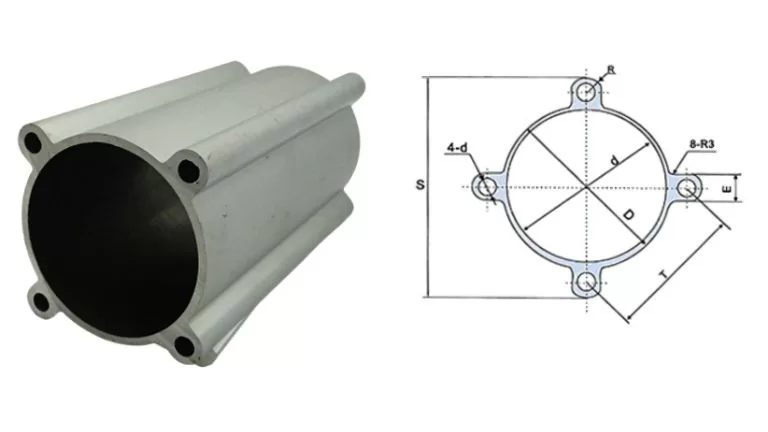
| NO. | d | D | T | S | E | 4-d |
|---|---|---|---|---|---|---|
| 1 | Φ32 | Φ36.5 | 33x33 | 55.3x55.3 | 10 | Φ5.2 |
| 2 | Φ40 | Φ44.5 | 37x37 | 65x65 | 10 | Φ5.2 |
| 3 | Φ50 | Φ55.3 | 47x47 | 77x77 | 12 | Φ5.2 |
| 4 | Φ63 | Φ68 | 56x56 | 93x93 | 12 | Φ6.8 |
| 5 | Φ80 | Φ85.8 | 70x70 | 115x115 | 15 | Φ8.7 |
| 6 | Φ100 | Φ106 | 84x84 | 135x135 | 15 | Φ8.7 |
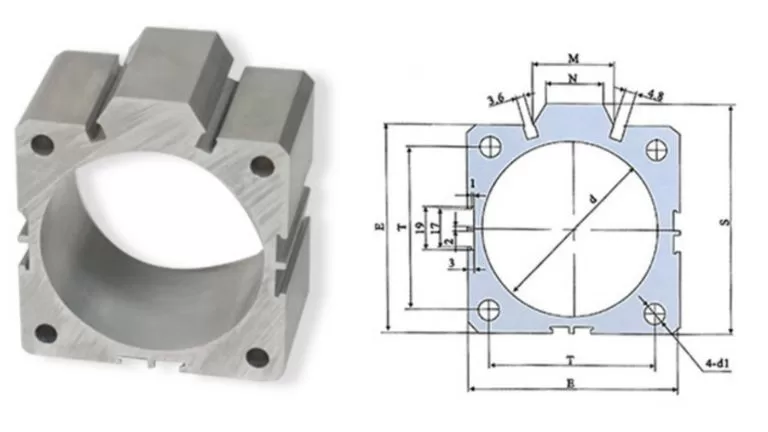
| NO. | d | E | S | T | 4-d1 | M | N |
|---|---|---|---|---|---|---|---|
| 1 | Φ20 | 34x34 | 36 | 24x24 | Φ4.2 | 11.3 | 10 |
| 2 | Φ25 | 40x40 | 42 | 28x28 | Φ4.6 | 12 | 10 |
| 3 | Φ32 | 44x44 | 50 | 34x34 | Φ4.6 | 18.3 | 15 |
| 4 | Φ40 | 52x52 | 58.5 | 40x40 | Φ6.5 | 21.3 | 16 |
| 5 | Φ50 | 62x62 | 71.5 | 48x48 | Φ6.5 | 30 | 20 |
| 6 | Φ63 | 75x75 | 84.5 | 60x60 | Φ6.5 | 28.7 | 20 |
| 7 | Φ80 | 94x94 | 104 | 74x74 | Φ9.2 | 36 | 26 |
| 8 | Φ100 | 114x114 | 124 | 90x90 | Φ11.3 | 35 | 26 |
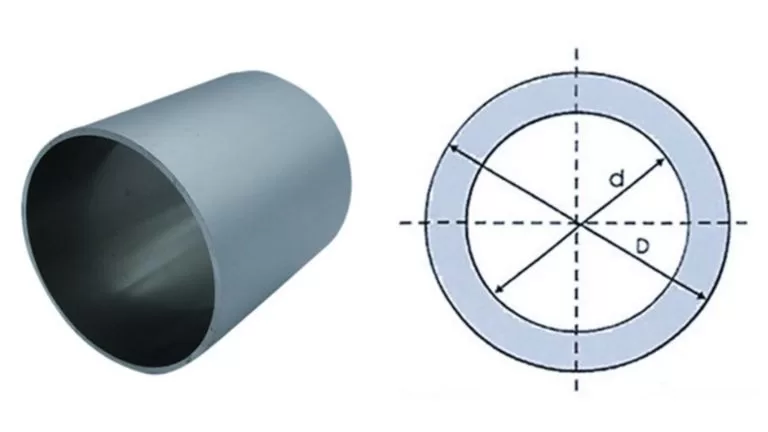
| ID d | OD D | Thickness |
|---|---|---|
| Φ20 | Φ25 | 2.5 |
| Φ25 | Φ30 | 2.5 |
| Φ30 | Φ35 | 2.5 |
| Φ32 | Φ37 | 2.5 |
| Φ35 | Φ40 | 2.5 |
| Φ40 | Φ45 | 2.5 |
| Φ50 | Φ55 | 4.5 |
| Φ63 | Φ59 | 3 |
| Φ63 | Φ69 | 5 |
| Φ63 | Φ73 | 2.5 |
| Φ70 | Φ75 | 2.5 |
| Φ75 | Φ80 | 3 |
| Φ80 | Φ86 | 3.5 |
| Φ80 | Φ87 | 3 |
| Φ100 | Φ106 | 3.5 |
| Φ100 | Φ107 | 5 |
| Φ100 | Φ110 | 5 |
| Φ125 | Φ135 | 5 |
| Φ200 | Φ210 | 5 |
| Φ250 | Φ262 | 6 |
| Φ300 | Φ316 | 8 |
| Φ320 | Φ336 | 8 |
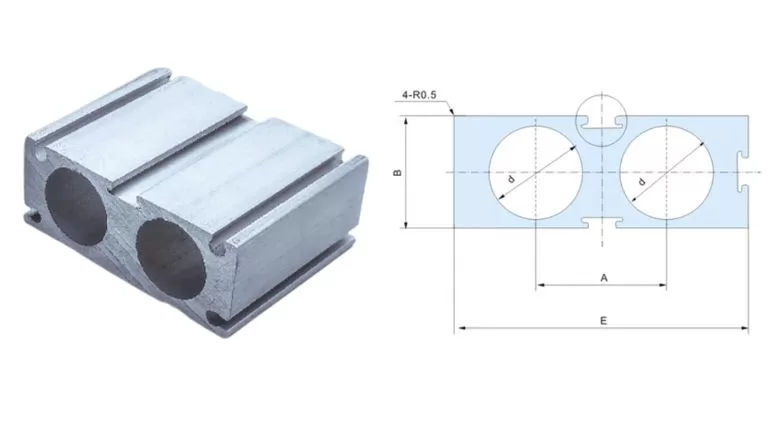
| NO. | d | E | A | B |
|---|---|---|---|---|
| 1 | Φ10 | 42 | 18 | 17 |
| 2 | Φ16 | 54 | 24 | 21 |
| 3 | Φ20 | 62 | 28 | 25 |
| 4 | Φ25 | 73 | 34 | 30 |
| 5 | Φ32 | 96 | 42 | 40 |
Aluminum Alloy for Cylinder Tubing
The most commonly used aluminum alloy for cylinder tubes is 6063-T5, valued for its excellent extrudability, lightweight properties, and good corrosion resistance. This alloy is ideal for standard pneumatic and hydraulic applications where moderate strength and cost-effectiveness are prioritized. Other materials can be customized based on specific requirements:
Higher Strength: 6061-T6 or 7075-T6 for heavy-duty applications.
Marine/Chemical Resistance: 5083 or 5052 for harsh environments.
Precision Components: Hardcoat-anodized 7000 series for wear resistance.
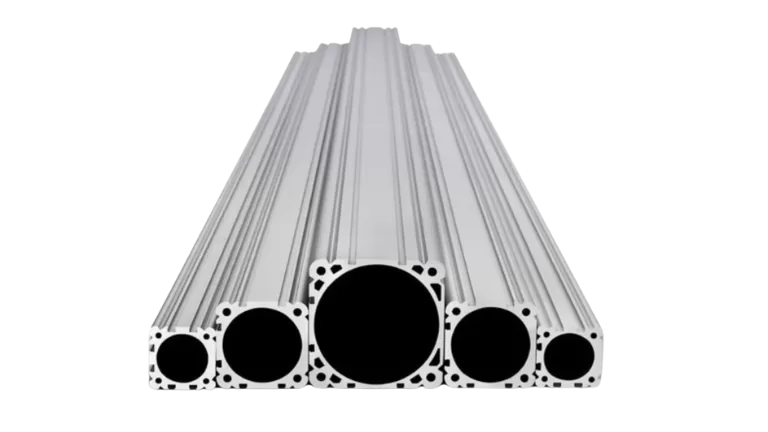
Our Factory
Our factory is equipped with 40 extrusion production lines to efficiently manufacture aluminum profile. We have one anodizing and electrophoresis line, along with two vertical spraying machines and two horizontal spraying machines for surface treatment. Additionally, we operate two sandblasting machines and six wood grain transfer printing lines, enabling us to provide various aesthetic finishes. To support our production, we also have furnaces for casting aluminum bars, aging furnaces, annealing furnaces, water cooling treatment equipment, and machining equipment, ensuring comprehensive capabilities for high-quality output.
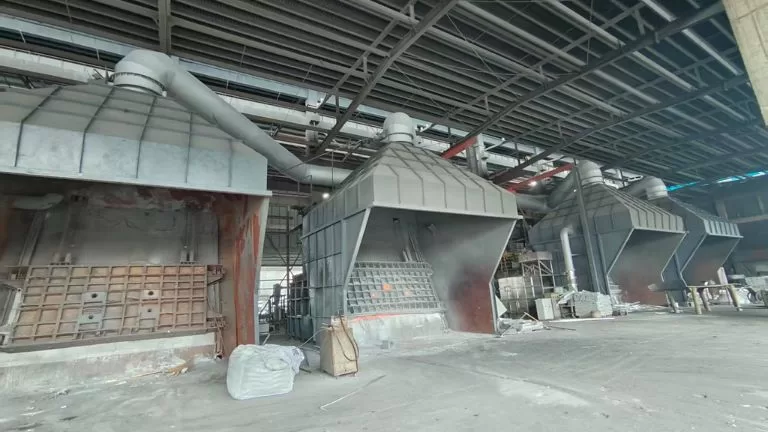

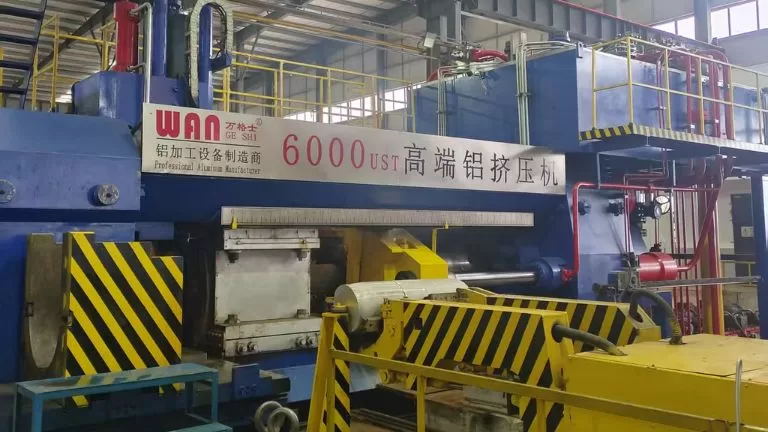

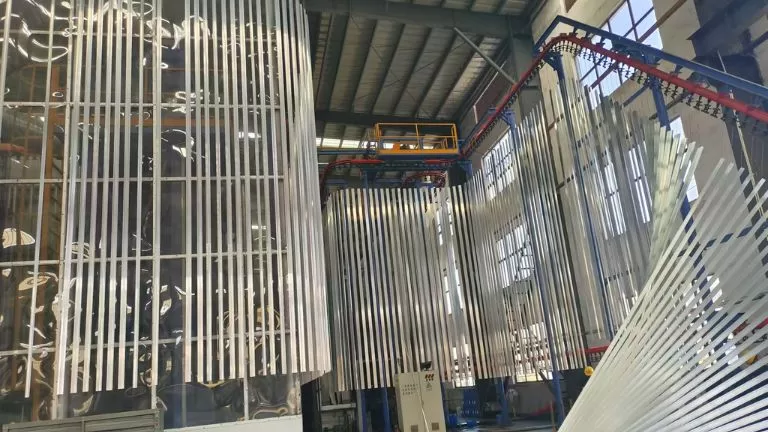
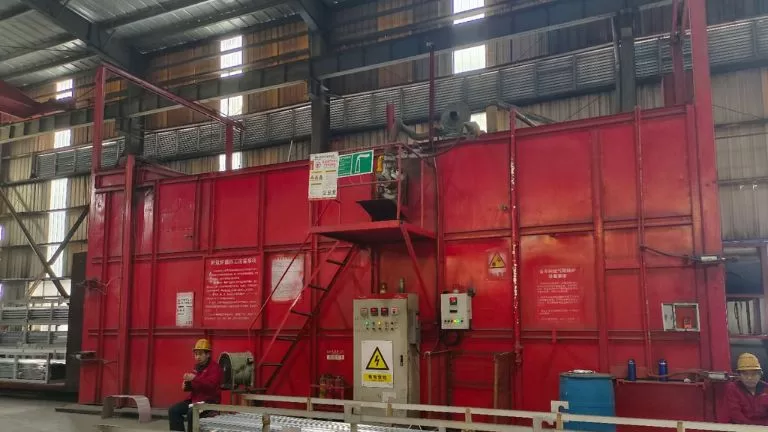
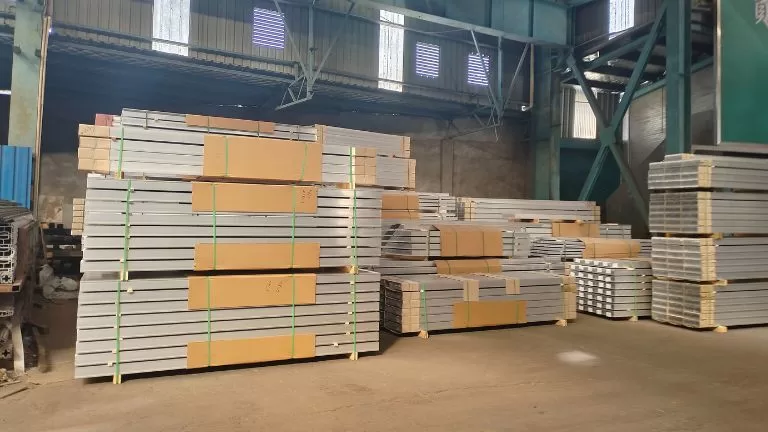

Custom Aluminum Cylinder from Us
HTS-ALU offers full customization for aluminum cylinder tubes, ensuring precise solutions for industrial, automotive, aerospace, and hydraulic applications. Our advanced manufacturing capabilities allow us to meet your exact specifications.
Profiles: Any shape (round, square, multi-chamber)
Materials: 6063-T5 (standard), 6061/7075 (high-strength), 5083 (marine-grade)
Surface Finishes: Anodizing, powder coating, polishing
Machining: CNC turning, boring, engraving
Packaging: Protective wrapping, barcode tracking
Contact us today to discuss your project requirements – we engineer solutions, not just parts!
RFQ of Extruded Aluminum Profile
HTS New Materials, based in Jiangxi Province, China, is a leading aluminum extrusion manufacturer with over 40 advanced production lines and powerful equipment, including a 6000-ton extrusion press. We produce a wide range of aluminum profiles for industries such as construction, industrial applications, and high-end doors and windows, including thermal break profiles. Our services extend to comprehensive surface treatments like anodizing, powder coating, fluorocarbon coating, and wood grain transfer, as well as advanced machining and fabrication capabilities such as CNC machining, drilling, and welding. Committed to quality and innovation, we deliver tailored aluminum solutions to meet the diverse needs of clients globally.
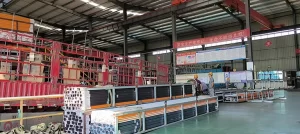
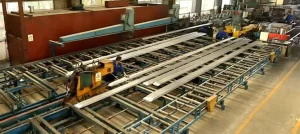
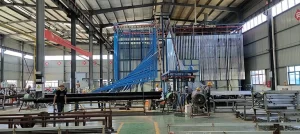
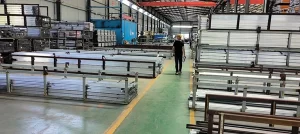

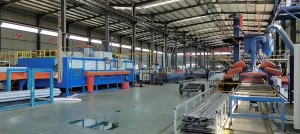
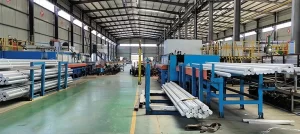
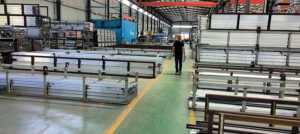
The primary aluminum alloys used for extrusion belong to the 6xxx series, specifically 6061, 6063, 6060,6082 and 6066. These alloys are highly favored due to their excellent extrudability, good mechanical properties, and corrosion resistance.
- 6061: A versatile alloy with higher strength, suitable for structural and transportation applications.
- 6063: Known as the “architectural alloy,” it offers excellent surface finish and is widely used for decorative and structural purposes.
- 6060: Similar to 6063 but with slightly lower strength, ideal for intricate and thin-walled profiles.
- 6066: A high-strength alloy within the 6xxx series, often used in more demanding structural applications.
- 6082: A strong alloy with better mechanical properties compared to 6061 and excellent corrosion resistance, commonly used in high-load structural applications and in marine environments.
The 7xxx series alloys, such as 7075, are used in applications requiring extremely high strength and performance, such as aerospace and high-end engineering projects. However, they have lower corrosion resistance when compared to 6xxx alloys and are therefore less commonly used for general extrusion applications.
While 1xxx, 3xxx, and 5xxx series alloys can be extruded, they are generally used infrequently for extrusion due to their lower strength or other limitations compared to 6xxx and 7xxx alloys. These series are mainly used in specialized applications. Additionally, if extrusion products from these series are requested, higher minimum order quantities (MOQ) are typically required for custom production, as their demand is relatively low.
The heat treatment of aluminum extrusions determines their mechanical properties, strength, and suitability for specific applications. Among the various heat treatment methods, T5, T6, and T66 are the most commonly used. Here’s an in-depth look:
| Heat Treatment State | Cooling Method | Strength | Key Features and Benefits | Applications |
|---|---|---|---|---|
| T5 | Air cooling (fan) | Moderate | Adequate strength, good dimensional stability, used for architectural purposes. | Windows, doors, curtain walls, building structures. |
| T6 | Water quenching (fast) | High | Higher strength and hardness, ideal for industrial and structural uses. | Automotive, aerospace, machinery, transport parts. |
| T66 | Water quenching (fast) | Very high | Optimized mechanical properties for higher strength and performance demands. | Automotive, rail transportation, high-end machinery. |
Other Heat Treatment States
- T4: Solution heat-treated and naturally aged. Used in applications requiring intermediate strength and enhanced formability.
- T7: Overaged for better stress-corrosion resistance, often used for aerospace and marine purposes.
- O (Annealed): Very soft condition suitable for extensive forming or bending requirements.
- F (As-Fabricated): No heat treatment applied, used in non-critical applications with low strength requirements.
Aluminum extrusions undergo various surface treatments to enhance aesthetics, corrosion resistance, and functionality. Here are the common surface treatment methods used in the industry:
Main Surface Treatment Methods
Anodizing (Oxidation)
- Process: A controlled electrochemical process that forms a protective oxide layer on the aluminum surface.
- Features:
- Provides a durable, corrosion-resistant, and environmentally friendly finish.
- Produces a metallic finish with a variety of natural tones (e.g., silver, black, bronze).
- Improves surface hardness and protects against scratching.
- Applications: Architectural frames, decorative profiles, heat sinks.
Electrophoresis Coating (E-Coating)
- Process: After anodizing, the aluminum is coated with paint using an electrochemical process.
- Features:
- Enhances corrosion resistance and offers a smooth, glossy finish.
- Provides more color and texture variation compared to anodizing alone.
- Applications: Furniture profiles, indoor architectural components.
Powder Coating
- Process: Electrostatic application of powder paint, followed by curing under high temperature to form a solid coating.
- Features:
- Wide variety of colors and textures.
- Excellent weather resistance and corrosion protection.
- Cost-effective and highly versatile.
- Applications: Outdoor frames, fences, railings, general industrial use.
PVDF Coating (Polyvinylidene Fluoride)
- Process: A specialized fluoropolymer coating is applied in multiple layers, commonly over a pretreated surface.
- Features:
- Exceptional weather resistance and UV stability.
- Highly durable, resistant to fading, chalking, and chemical damage.
- Ideal for long-term outdoor use.
- Applications: Curtain walls, high-performance architectural facades.
Wood Grain Transfer Printing
- Process: A heat-transfer printing process that applies a wood grain effect onto a pre-coated aluminum surface.
- Features:
- Mimics the appearance of wood while retaining aluminum’s durability.
- Lightweight and weather-resistant alternative to natural wood.
- Applications: Furniture, decorative coverings, outdoor panels.
Film Lamination
- Process: Adhesive application of a protective or decorative film onto the aluminum surface.
- Features:
- Provides a glossy, textured, or patterned finish.
- Often used for applications requiring specific textures like marble or leather effects.
- Applications: Interior decor, windows.
Pre-Treatment Processes
Prior to surface treatment, the aluminum surface can be pre-processed for specific textures or finishes:
Brushing/Polishing
- Removes surface imperfections and creates a smooth, reflective finish.
- Often used for decorative purposes.
Sanding/Grinding
- Produces a matte or satin finish by applying abrasives.
Shot Blasting/Sandblasting
- Sprays abrasives at high velocity to create a textured surface, often used before anodizing for a uniform appearance.
Stretching and Tension Leveling
- Straightens the aluminum profile and improves shape accuracy after extrusion.
Cost and Durability Comparison Table
| Treatment Method | Process Cost | Surface Durability | Weather Resistance | Applications |
|---|---|---|---|---|
| Anodizing (Oxidation) | Medium | Very Durable | High | Architectural frames, industrial parts. |
| Electrophoresis (E-Coating) | Medium-High | Durable | Medium | Furniture, indoor parts, decorative uses. |
| Powder Coating | Medium | Highly Durable | High | Outdoor frames, industrial fixtures. |
| PVDF Coating | High | Extremely Durable | Excellent | Curtain walls, high-end exteriors. |
| Wood Grain Printing | Medium | Moderate (topcoat dependent) | Medium | Decorative panels, furniture. |
| Film Lamination | Low-Medium | Moderate | Low | Indoor decorations, windows. |
| Brushing/Sandblasting (Pre-Treatment) | Low | Not Applicable (Preparation only) | N/A | Preparation for further treatment. |
. Anodizing (Oxidation)
- Common Colors:
Natural silver
Black
Champagne
Light bronze
Dark bronze
Gold
2. Electrophoresis Coating (E-Coating)
- Common Colors:
Black
Champagne
Light bronze
Dark bronze
Custom metallic colors
3. Powder Coating
- Colors:
Can match any color based on the RAL color chart.
Offers textures like matte, gloss, satin, and custom finishes.
4. PVDF Coating (Polyvinylidene Fluoride)
- Colors:
Also customizable using the RAL color chart.
High-end finishes with matte or glossy effects.
5. Wood Grain Transfer Printing
- Colors and Patterns:
Mimics various wood types (e.g., oak, walnut, teak, mahogany).
Custom patterns available based on provided samples.
6. Film Lamination
- Colors and Patterns:
Includes textures like marble, leather, and solid colors.
Custom finishes and patterns based on provided samples.
Pre-Treatment Options (Impact on Final Color)
- Brushing/Polishing: Produces smooth or reflective metallic surfaces.
- Sandblasting: Adds a rough, matte texture before the final surface treatment.
We provide a wide range of machining services for aluminum extrusions to meet specific requirements. These include cutting off/section removal, slotting, drilling holes, tapping threads, bending, and localized stamping to create deformations. For example, we can trim extruded profiles to custom lengths, mill precise grooves, create threaded holes for fasteners, bend profiles into specific shapes, or apply localized stamping to achieve custom forms or deformation.
In addition to these processes, we also offer TIG/MIG welding to join aluminum components for a solid structure. Furthermore, our services include assembly of common accessories, such as brackets, corner connectors, screws, hinges, end caps, and rubber seals, providing complete and ready-to-install profile solutions tailored to your project needs. This ensures that we can handle everything from simple cuts to highly customized fabrication and assembly, all with precision and efficiency.
For custom aluminum extrusion projects, we accept a variety of drawing formats, including CAD files, STEP files, and PDF files. However, for extrusions that require additional machining processes, it’s recommended to provide STEP files, as they ensure precise 3D modeling for machining accuracy.
While PDF files are acceptable, converting them into CAD drawings may result in the loss of certain details, requiring us to manually redraw the design, which could increase lead time. For the fastest and most accurate quotation, we recommend providing CAD files (e.g., DWG/DXF) and STEP files to ensure efficient design evaluation and pricing.
Mold fees are an essential part of the custom aluminum extrusion process. Since every order requires a uniquely designed mold tailored to specific requirements, these molds cannot be used for other products. Therefore, the mold fee is necessary and non-negotiable.
We require 100% upfront payment of the mold fee before mold development begins to ensure timely production. However, as a token of appreciation for your support, we offer a refund of the mold fee or equivalent discounts once the order reaches a certain production volume. Specific policies can be discussed based on your order volume and collaboration details.
Our minimum order quantity (MOQ) varies depending on the size of the product. For smaller-sized products, the MOQ is typically 500kg, while for larger-sized products, it is 2 tons.
We will specify the exact MOQ requirements during the quotation process. If your order quantity does not meet the MOQ, we can still arrange production, but an additional fee will be applied to cover mold preheating and production setup time. Rest assured, this extra fee will be reasonable, and we aim to keep it as minimal as possible to ensure smooth cooperation.
Packaging can be customized according to your needs. Options include using protective film or paper to separate and protect the surface, or foam film for additional surface protection. Products can be palletized or packed into cartons, and the quantity per pallet or carton can be specified by the customer.
The standard packaging involves bundling several pieces together with plastic wrap and then securing them onto pallets. Any packaging requirements beyond the standard will be accommodated, and the associated costs will be clearly provided to the customer.
Mold production typically takes 7 days. After the sample is confirmed, producing a full container load of 26 tons generally requires 14 days for extrusion alone. If surface treatment is required, an additional 3 days will be needed. For machining, extra time will be required depending on the complexity and volume of the machining work. The exact additional time for machining will be determined based on the specific processing requirements.
Aluminum profiles are naturally corrosion-resistant due to the formation of a thin, protective oxide layer when exposed to air or water. This oxide layer is stable and self-repairing, meaning that even if the surface is scratched or cut (such as at exposed ends or during processing), the aluminum will not rust or corrode like iron or steel. Instead, the exposed areas will quickly form a new oxide layer, providing continuous protection against further oxidation.
With proper design, installation, and maintenance, aluminum profiles can last for decades, even in challenging environments. For example, untreated aluminum can easily withstand 20-30 years in outdoor applications, while profiles with surface treatments like anodizing or powder coating can last even longer, often exceeding 50 years. This makes aluminum an excellent choice for applications where durability and long-term performance are essential.
The price of aluminum profiles consists of several components: raw material costs, extrusion processing fees, surface treatment fees, machining costs, and additional packaging fees. Among these, the cost of aluminum as a raw material tends to fluctuate frequently, while other fees remain relatively stable. Due to these fluctuations, our quotations are typically valid for 7 days.
Pricing can be structured in different ways depending on the product and requirements. It can be calculated by weight (e.g., cost per ton), by length (e.g., cost per meter), or by piece (e.g., cost per unit). For products involving extensive machining, such as heat sinks, pricing is generally calculated on a per-piece basis to accurately reflect the additional processing costs. This flexible pricing approach ensures the quote is tailored to the specific needs of the customer.
We can manufacture aluminum profiles in compliance with technical requirements that meet European standards (EN), American standards (ASTM/AA), or other standards as specified by the customer. Custom production is tailored to ensure that the profiles meet the specific standard requirements requested.
Our production equipment is designed for the metric system. If the drawings provided are in the imperial system, we will convert them into metric units for production to ensure accuracy.
It is important to note that while we can machine imperial-threaded holes for fasteners, if you require us to supply matching imperial fasteners, they may not always be available in stock. Custom orders for imperial fasteners typically require a large volume for production. Please consider this when planning your project.
The majority of aluminum profiles we produce are custom-made and do not have existing molds. However, for some standard profiles such as square tubes, round tubes, U-channels, and T-SLOT profiles, we do have existing molds, and in some cases, small quantities in stock.
For certain specialized profiles, like ladder aluminum profiles, we have some molds that may be used across similar designs. For curtain wall and window/door profiles, we have developed a number of molds, though most are tailored to the Chinese domestic market.
Additionally, for furniture-related profiles, such as cabinet handles, cabinet door frames, skirting boards, tile edge trims, wall panel trims, stair anti-slip strips, partition aluminum profiles, corrugated aluminum profile (like long-span profiles), LED light channels, and photovoltaic frame supports, we offer a selection of ready-made designs and some existing molds.
While we have limited stock of standard profiles like square tubes, round tubes, U-channels, and T-SLOT profiles, we recommend contacting our sales team for details on availability and further assistance.
